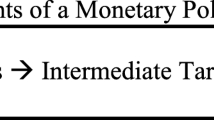Abstract
This paper explores the question of how national fiscal policies could be conducted within the European Monetary Union. The discussion touches upon this issue in relation to the theory of optimum currency areas; presents the debt sustainability issue in the context of a monetary union; examines briefly the determinants of debt dynamics; and interprets the restraints imposed on national fiscal policies by the Maastricht Treaty. The tentative conclusion is that the creation of the EMU will be associated with smaller size national government sectors.
Similar content being viewed by others
References
Bayoumi, T.; Eichengreen, B. "Shocking Aspects of European Monetary Integration," CEPR Discussion Paper Series, 643, 1992.
Bean, C. R. "Economic and Monetary Union in Europe,"Journal of Economic Perspectives, 6, 4, 1992, pp. 31–52.
Bini Smaghi, L.; Vori, S. "Rating the EC as an Optimal Currency Area,"Banca d' Italia, Temi di Discussione, 187, January 1993.
Buiter, W.H. "Government Deficits Reinterpreted,"Economic Policy, 1, 1985, pp. 13–79.
Commission of the European Communities,European Economy, Luxemburg: Office for Official Publications on the European Communities, 44, Ch. 2, 1990.
__.European Economy, Luxemburg: Office for Official Publications on the European Communities, 54, 1993.
Committee for the Study of Economic and Monetary Union(Delors Report), Report on Economic and Monetary Union in the European Community, Luxemburg: Office for Official Publications on the European Communities, 1989.
Eichengreen, B. "Should the Maastricht Treaty be Saved?"Essays in International Finance, 74, Princeton, December 1992.
__. "Is Europe an Optimum Currency Area?" CEPR Discussion Paper Series, 478, 1990.
Fratianni, M.; von Hagen, J.; Waller, C. "The Maastricht Way to EMU,"Essays in International Finance, 187, Princeton, June 1992.
de Grauwe, P.The Economics of Monetary Integration, Oxford: Oxford University Press, 1992.
de Grauwe, P.; Vanhaverbeke, W. "Is Europe an Optimum Currency Area? Evidence from Regional Data," CEPR Discussion Paper Series, 555, 1991.
Gros, D.; Thygesen, N.European Monetary Integration: From the EMS to EMU, London: Longman Press, 1992.
de Haan, J.; Zelhorst, D. "The Impact of Government Deficits on Money Growth in Developing Countries,"Journal of International Money and Finance, 9, 1990, pp. 455–69.
von Hagen, J.; Neumann, M. J. M. "Real Exchange Rates within and between Currency Areas: How far away is EMU?" CEPR Discussion Paper Series, 660, 1992.
Kenen, P.EMU after the Maastricht, Washington, D.C.: Group of Thirty, 1992.
Melitz, J. "A Suggested Reformation of the Theory of Optimal Currency Areas," CEPR Discussion Paper Series, 590, 1991.
Minford, P.; Rastogi, A.; Hallett, A. H. "The Price of EMU Revisited," CEPR Discussion Paper Series, 656, 1992.
Mundell, R. "A Theory of Optimum Currency Areas,"American Economic Review, 51, 1961, pp. 657–65.
Author information
Authors and Affiliations
Additional information
Invited Address at the Thirty-Seventh International Atlantic Economic Conference, Athens, Greece, March 8–15, 1994. Financial support by the Economic Research Center of the Athens University of Economics and Business is gratefully acknowledged.
Rights and permissions
About this article
Cite this article
Demopoulos, G.D., Prodromidis, K.P. Fiscal discipline in the European monetary union. Atlantic Economic Journal 22, 1–7 (1994). https://doi.org/10.1007/BF02301794
Issue Date:
DOI: https://doi.org/10.1007/BF02301794




